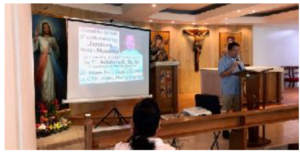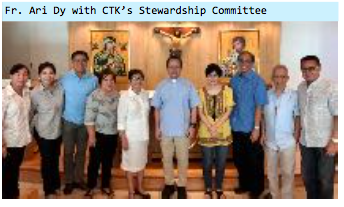Parish Enjoined to Follow Jesus with Maturity at Stewardship Talk
 Fr. Ari Dy, President of Xavier School, was the guest speaker for the Stewardship Committee’s quarterly formation talk held last September 22. It forms part of the committee’s continuing Spirituality of Stewardship series and in celebration of the 13th year anniversary of ‘Stewardship as a Way of Life’ in the CTK parish. Fr. Dy’s talk, conducted from 10 am to 12 noon at the Divine Mercy Chapel, was entitled ‘Good to Great: Following Jesus with Maturity’.
Fr. Ari Dy, President of Xavier School, was the guest speaker for the Stewardship Committee’s quarterly formation talk held last September 22. It forms part of the committee’s continuing Spirituality of Stewardship series and in celebration of the 13th year anniversary of ‘Stewardship as a Way of Life’ in the CTK parish. Fr. Dy’s talk, conducted from 10 am to 12 noon at the Divine Mercy Chapel, was entitled ‘Good to Great: Following Jesus with Maturity’.
Fr. Dy started with the premise that everyone in the room were on the path of essential Christian discipleship, that is, private prayer and private integrity as habits; exercising charity and justice, working for the survival of the weakest and the gentlest; involvement within an ecclesial community; and forgiveness and mellowness of heart. But the difficult part is to move from essential discipleship to ‘mature discipleship’.
Fr. Ari invited the participants to look at six invitations that come to us in the Gospels, namely:
1.To look for Christ on the way to Emmaus. In our journey of discipleship, we will be discouraged and tempted to walk away towards some place of consolation, say, Emmaus, but on that road, Christ will appear in a new guise. Initially we will not recognize him, but in that encounter, Jesus will restructure our imagination and our faith and we will recognize Christ anew, in a much deeper way; and that recognition will turn us away from Emmaus, the place of consolation, and back to our dream of faith and our church, our Jerusalem.
2.To remain committed, like Peter, when everything in us suggests that we walk away. When Jesus said, ‘For my flesh is true food, and my blood is true drink. Whoever eats my flesh and drinks my blood remains in me and I in him. Unlike your ancestors who ate and still died, whoever eats this bread will live forever.’ Many of his disciples who were listening didn’t understand and no longer accompanied him. Jesus then said to the Twelve, “Do you also want to leave?” Simon Peter answered him, ‘Master, to whom shall we go? You have the words of eternal life. We have come to believe and are convinced that you are the Holy One of God.’ Peter’s words are a paradigm for maturity and sustained commitment. Anyone who has ever been in a commitment for a long time, be it marriage, religious vocation, or some service to the community, knows that there are days and seasons when you’d like to walk away – except you are smart enough to know that, in the long run, the commitment brings you life! One of the major trials in mature discipleship is that of fidelity, of remaining steadfast and loving within our commitments over the long haul, after our initial emotional fervor has waned and some disillusionment has set in.
3.To walk as both ‘Son of David’ and as ‘Lord’ inside the regions of Tyre and Sidon. At a certain point in his ministry, Jesus leaves the Jewish regions within which he is preaching and withdraws to the notoriously pagan region of Tyre and Sidon. There he is approached by a Syro-Phoenician woman to cure her daughter. Jesus says to her: ‘I was sent to the lost sheep of the house of Israel, and to them alone. It is not right to take the children’s bread and throw it to the house dogs.’ The woman replies,
‘Lord, even the dogs eat the scraps that fall from the master’s table.’ Upon hearing this, Jesus says to her: ‘What faith you have!’ And he heals her daughter. The woman pleads with him twice, first as Son of David, the Jewish Messiah, the identity Jesus had up until then embraced. She then addresses him as Lord, calling him to a wider loyalty by appealing to another identity that Jesus also carries. She appeals to him as God’s universal instrument of salvation for everyone, those prepared and those not.
4.To look frantically for the lost coin. Biblical compassion demands that we never be content for as long as some of our members are separated from us. Jesus teaches this all the time, as in the parable of the lost coin. We can reframe the story and say that the woman had ten children. Nine of them were okay and had a good relationship with her, but one was estranged, the so-called black sheep. The mother never stopped trying to reconcile with that one child the black sheep, and after many attempts they are finally reconciled. The woman is so happy that despite being of modest means, she throws a big party to celebrate the wholeness of her family. We are compassionate as God is compassionate only when, like Jesus, we remain in tears for those ‘other sheep that are not of the fold,’ and like the woman and her ten coins, we go out and turn everything upside down until we restore the wholeness that has been lost.
5.To live the baptism of Jesus and not just of John. John is in prison and can hear the party going on where the daughter of Herodias is entertaining the crowd. John will soon be beheaded, but he doesn’t seem troubled by it. He might as well die, he feels, because he is only half a man and half a prophet. John is aware of both his strength and his impotence. He can point out what’s wrong and what needs to be done, but after that he is helpless, with nothing to offer in terms of the strength needed to correct the wrong. He can call people to repentance, but that is all. John’s is a baptism of repentance, a realization of what we are doing wrong and a resolution to correct our bad behavior. The baptism of Jesus is entry into grace and community so that we can do what is impossible by will power alone. Too often, we are already adults but we still try to live our lives by John’s baptism alone.
6.To wait in the Upper Room with other disciples. At the end of Luke’s Gospel, before he departs this earth, Jesus tells his followers to return to the city and not to leave until they feel themselves clothed with power from on high. In the Upper Room, we find a formerly confident bunch of apostles, now confused and out of energy, needing to be recharged, unsure of what they were waiting for, but waiting nonetheless for something new to happen to them, for new fire, for new vision, for a new energy from beyond. This can describe us too. Waiting is an act of hope, for the promise to be fulfilled.
 Accepting the six invitations in your adult years allows you to live a less self-centered life. Mature discipleship is about expanding your perspective, your love, your patience and perseverance, and your compassion. It is about integrating divided loyalties, grace, and human nature. It is finding God in all things and finding faith in community.
Accepting the six invitations in your adult years allows you to live a less self-centered life. Mature discipleship is about expanding your perspective, your love, your patience and perseverance, and your compassion. It is about integrating divided loyalties, grace, and human nature. It is finding God in all things and finding faith in community.
The talk received very favorable feedback from the participants. ‘The talk was inspiring, useful, and insightful’, said one listener. ‘The Bible readings used were explained in a different light, giving me new information and insights’, said another. A third said, ‘Fr. Dy’s points were very useful for people at mid-life – instructive and inspiring in a comforting kind of way’.
